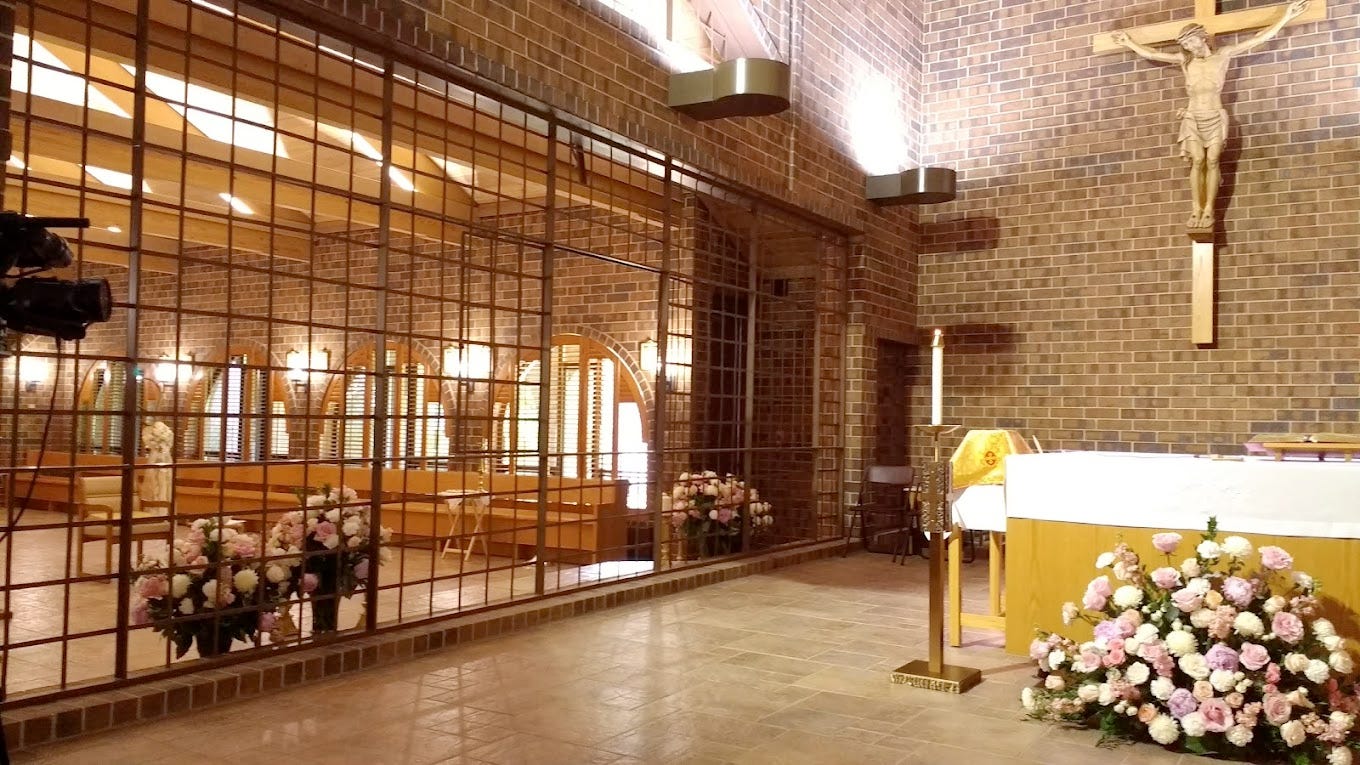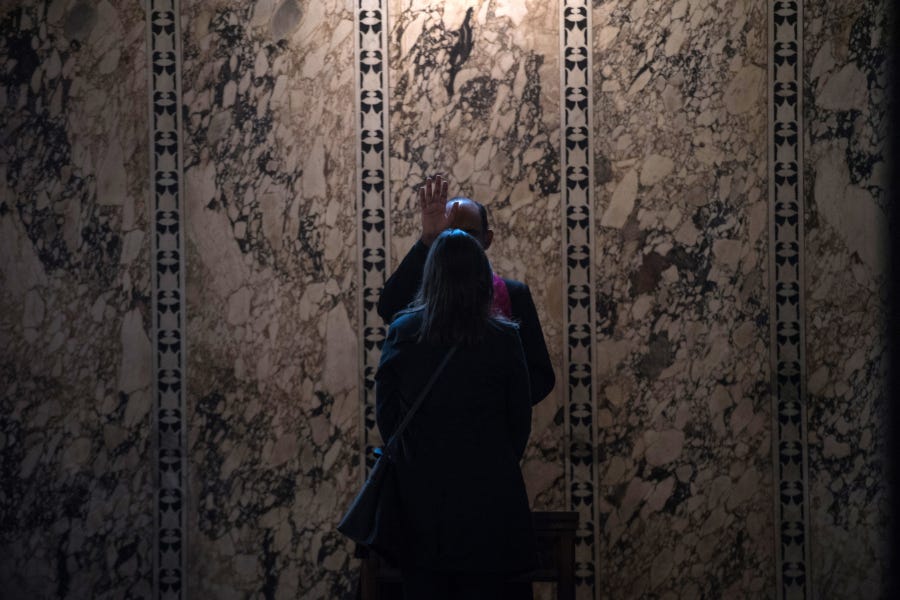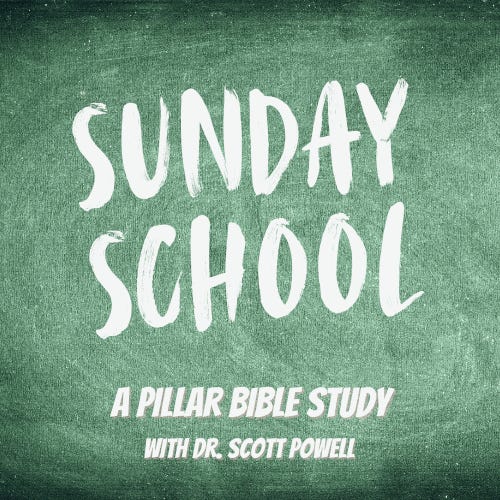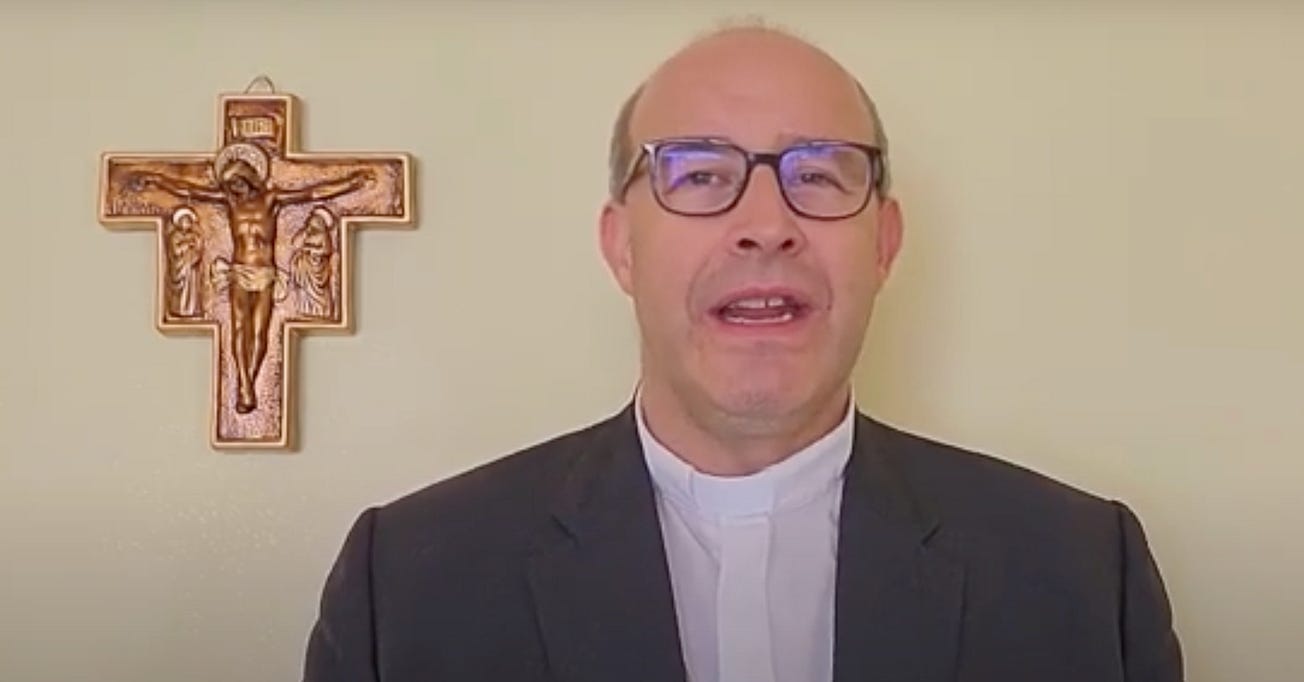An attorney for the Carmelite nuns of Arlington, Texas, issued a statement Wednesday which claimed both to recognize Bishop Michael Olson’s authority as diocesan bishop, and to reject his Vatican-conferred authority to intervene over the Carmelite community.
The lawyer’s statement comes after Olson warned that the nuns might have incurred the penalty of excommunication by their recent statements about his authority.
As Olson and the nuns continue to issue public statements, sources in Texas have told The Pillar that the Vatican is likely preparing an apostolic visitation of the monastery.
“The Arlington Carmelite nuns are not, and have no intention of, separating from the Catholic Church despite the incongruous statement made by the bishop. They remain dedicated to the Catholic Church and the Holy See and pray that the Vatican will put an end to this malicious persecution by the bishop. The Arlington Carmelite Nuns recognize the bishop as the local ordinary and respect his role therein, a role they have recognized for every single Diocesan Bishop since 1958, including Bishop Olson for the past 14 years,” the nuns’ lawyer wrote in an Aug. 23 statement.
“These powers are definitively laid out in canon law and are very limited powers with regards to the Monastery. The Arlington Carmelite Nuns do not and will not recognize this bishop’s unwarranted and unauthorized abuse and wielding of the complete power he suddenly is trying to exercise over the Monastery,” the nuns’ lawyer added.
The statement seems intended to affirm Olson’s ordinary prerogatives as diocesan bishop, while rejecting as “unauthorized” the authority he’s exercised as the Vatican-appointed “pontifical commissary” over the affairs of the monastery — a position by which the Vatican gave Olson “full governing powers” for the Carmelite community.
Olson argued that the nuns made a “schismatic and scandalous” statement last week, when they said on Friday they “no longer recognize” their bishop’s authority.
While Olson did not formally declare the nuns excommunicated, he warned the penalty was a possibility.
The Aug. 23 statement from the monastery insisted that the nuns accept Olson’s authority as diocesan bishop, and are awaiting a Vatican response to appeals against Olson’s decisions at the monastery, where he was appointed “pontifical commissary” earlier this summer, amid a contentious dispute between the bishop and the nuns.
But the statement also seemed to dispute a Vatican decision to place Olson in charge of the monastery.
The attorney claimed that said the nuns “do not and will not recognize this bishop’s unwarranted and unauthorized abuse and wielding of the complete power he suddenly is trying to exercise over the Monastery.”
After the May decree issued by the Vatican Dicastery for Institutes of Consecrated Life and Societies of Apostolic Life, the Fort Worth diocese stated that “Bishop Olson has been, and continues to be, entrusted with full governing responsibility for the monastery” as “the pope’s representative in this matter.”
Since last week, Olson has claimed twice that the nuns’ rejection of his authority at the monastery is actually a repudiation of the Holy See’s prerogative to confer his governing authority — and thus a “schismatic” claim.
The Aug. 23 statement did not explicitly address that point.
The recent salvos between the monastery and Olson’s chancery suggest that the conflict — which began with allegations that the monastery’s superior had committed sexual misconduct — has become intractable.
While the nuns insist on canonical sovereignty from the Fort Worth diocese, the canonical issues at play in the dispute have become muddled, as statements from the monastery have become increasingly incendiary, and less referent to canonical norms.
But as each side issues statements, a Fort Worth diocesan official speaking on background told The Pillar this week that Rome’s next step is likely to be an apostolic visitation, conducted by someone from outside the diocese — and that part of the goal in that visitation will be to assess whether the nuns inside the Carmel understand the significance of the dispute between their superior and their bishop.
The conflict between Bishop Olson and the nuns of the Carmelite Monastery of the Most Holy Trinity came into the public eye in May, when Olson initiated a canonical investigation into their superior, Mother Teresa Agnes Gerlach, for allegedly admitting to violating her vow of chastity with an initially unnamed priest.
Lawyers for the convent and for Gerlach, both civil and canonical, have said that her supposed admission of an affair was made following a serious medical procedure, under the influence of painkillers, and when she was in and out of lucidity.
Olson, however, said the prioress had repeated her admission to him during an in-person conversation, in the presence of several other individuals. He said Gerlach was lucid and spoke clearly at the time, and was not recovering from surgery at the time.
The bishop claimed that the nun named the priest — who was identified in June by his diocese as Fr. Philip Johnson of the Diocese of Raleigh — during that conversation, and that the priest’s diocese of residence, his immediate superior, and his bishop had all been informed of the situation.
The nuns, in response, filed a million-dollar civil suit against the bishop, as well as a criminal complaint alleging that Olson had stolen their property by seizing their phones and computers during a search of the convent. They have suggested that the bishop’s actions are financially motivated, and that he is seeking their donor list.
The bishop told the sisters he was restricting their access to Mass and confession until they withdrew the lawsuit. He reportedly restored their access to the sacraments on June 1, when he also issued a decree dismissing Gerlach — though the nuns say it is abusive that Olson has not permitted local Catholics to enter the nuns’ chapel.
His decree came one day after the Vatican appointed Olson “pontifical commissary” for the sisters and retroactively sanated any and all canonical procedural issues raised by Olson’s previous actions involving the monastery.
In June, the diocese also said that it was in communication with the local police department regarding serious concerns over “the use of marijuana and edibles at the monastery,” along with what it called “other issues that the diocese will address at another time and in a proper forum.”
The diocese released photos which it says are from the inside of the monastery. The images appear to show an office with several tables strewn with drug paraphernalia, dispensary bottles, branded marijuana products, bongs, and a crucifix.
But the nuns have apparently continued to recognize Gerlach as their superior, and they have made various appeals to Rome, including the objection that Olson had employed powers reserved for a criminal canonical investigation despite the mother superior’s alleged actions — while sinful — not constituting a specific crime in canon law.
The conflict escalated Friday, when the nuns released an unexpected statement rejecting Olson’s authority, alleging months of “unprecedented interference, intimidation, aggression, private and public humiliation and spiritual manipulation as the direct result of the attitudes and ambitions of the current Bishop of Fort Worth.”
“No one who abuses us as has the current Bishop of Fort Worth, has any right to our cooperation or obedience,” the statement said.
“For our own spiritual and psychological safety, and in justice, we must remain independent of this Bishop until such time as he repents of the abuse to which he has subjected us, apologizes in person to our community for it and accepts to make due public reparation,” the nuns wrote.
They also released on Friday a statement of support apparently written by former U.S. apostolic nuncio Archbishop Carlo Vigano.
“The repeated abuses of power by those who hold ecclesiastical Authority over religious Communities – especially communities of contemplative women – are part of a subversive plan carried out by corrupt and heretical Prelates whose purpose is to deprive the Church of the Graces which such Consecrated souls cause to descend upon Her,” the statement said.
The Vigano statement connected the conflict in Texas to Vigano’s long standing criticism of Pope Francis.
“I invite everyone to support the courageous resistance of the Carmelite Nuns of Arlington with prayer and material help, not only for the sake of supporting them but also in order to send a clear signal to those in the Church who believe that they hold absolute power, even to the point of contradicting with impunity the Authority of Christ, the Head of the Mystical Body.”
Those Friday statements from the Carmel prompted Olson’s Saturday statement, in which the bishop said that Gerlach and other nuns of the monastery “may have incurred” the ecclesiastical penalty of excommunication.
Olson said Saturday that he believed the nun’s statement was an act of schism — a public rejection of his “authority as diocesan bishop and [as] pontifical commissary” of the nuns’ monastery. But while canon law would have permitted him to declare by decree that Gerlach was formally excommunicated, the bishop wrote instead only that her excommunication was a possibility.
He made a similar statement about the other nuns of the monastery, writing that they, “depending on their complicity in Mother Teresa Agnes’ publicly, scandalous and schismatic actions could possibly have incurred the same latae sententiae excommunication.”
A diocesan official speaking on background told The Pillar that Olson had also given the nuns instructions — among them, that they withdraw their Friday statement, and that Mother Teresa Gerlach, the Carmel’s superior, stop acting as superior, given Olson’s efforts to remove her.
It is not clear whether the bishop will regard the Aug. 23 statement as satisfactory, or with — with the prospect of a visitation looming — Olson will simply wait for Vatican intervention before proceeding.
Olson wrote that he “stand[s] ready to assist Mother Teresa Agnes on her path of reconciliation and healing.”
But while he addresses problems in the monastery, some Catholics in Fort Worth say that Olson has a record of acting rashly, or autocratically, amid disputes in the diocese. Some point to a group of Catholics which has submitted a petition to the Vatican calling for Olson’s removal, citing the Carmelite conflict and several other issues. The group says more than 900 people have signed a petition sent to the Vatican.
For their part, the nuns said Wednesday they are hopeful for a Vatican intervention.
“The nuns place their hopes and prayers on a just and fair review of the canonical case by the Vatican to ensure that acts taken by Bishop Olson will be reversed and they will be completely exonerated, allowing them to return to their prayerful contemplative life without further unlawful interference by Bishop Olson. The nuns also welcome the faithful to pray in our Chapel and to take part in the Sacred Liturgy as Our Lord, in His goodness, will provide,” they wrote Wednesday.
As the case has escalated, a canonist close to the monastery told The Pillar that in his view, the conflict could have been resolved more peacefully.
“I think both sides here just got too hot, way too quickly, and this thing has spun completely out of control since then. It’s really a shame it couldn’t have gone differently.”
Reached Wednesday by The Pillar, the nuns’ attorney initially argued that Olson’s interventions at the monastery were “unauthorized” canonically, explaining that the had been advised by unspecified canon lawyers that the position of pontifical commissary entails only limited powers.
When The Pillar noted that Olson was given by a Vatican dicastery “full governing powers” at the monastery, the lawyer said he had been advised otherwise by unspecified canon lawyers, adding that he believes Olson’s interventions have been illegal under Texas civil law.
Editors’ note: This report was updated after publication to include comments from the Carmelites’ attorney.




